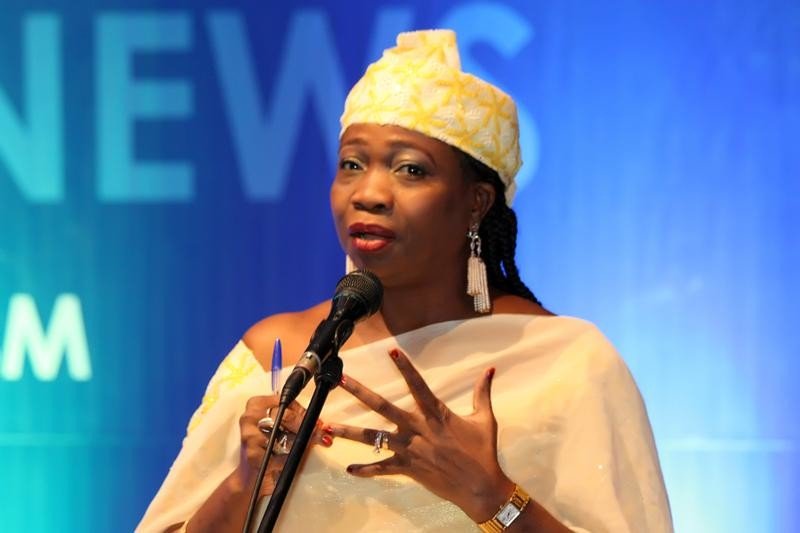News
Medical tourism will end when professionals in Diaspora get involved — Dabiri-Erewa

The Nigerians in Diaspora Commission (NIDCOM) said on Wednesday that medical tourism would be a thing of the past the moment Nigerian professionals in the Diaspora invested in the medical sector.
Its Chairman/CEO, Mrs Abike Dabiri-Erewa, said this when she visited the Cardiology and Cardiothoracic Diaspora Project at the Trauma Centre of the National Hospital, Abuja (NHA).
It was reported that the project, which is a collaboration with Spem Quia Filii Foundation, Healing Little Hearts UK and the National Hospital Abuja had 15 medical professionals of different areas related to Cardiology.
(Spem Quia Filii means: Giving Hope to Children with Heart Disease)
Dabiri-Erewa said that the commission was working on a Diaspora doctors’ programme, which would engage Nigerians living in the Diaspora to collaborate with their homeland and save its medical sector.
She urged Nigerians in the Diaspora to support and bring teams of medical professionals not only in heart-related issues, but also in general medicine.
According to Dabiri-Erewa, in a little while, a formal programme will be launched to address the issues, adding that it is heartwarming to know that Nigerians are giving back even as the government is working to create a lasting solution in the sector.
Similarly, Dr Aisha Umar, Director, Clinical Services, NHA, said that the hospital had worked with Healing Little Hearts, a UK Foundation, for years to bring succour to patients.
According to her, its services are free, with no cost to the hospital, but the patients pay a nominal fee of N500,000 to N2.5 million which cannot compare to the cost of the heart procedure.
Umar said that apart from the voluntary heart operation the team offered they also engaged local nurses in training and that had also reduced cost of the entire procedure.
“We have 45 patients on the list, they go into the theater at 6 a.m., they want to operate on three patients daily, and they have been able to operate on 29 patients so far,’’ she said.
Dr Patrick Uwusanmwen, Chief Executive of Spem Quia Filii Foundation Nigeria, said that the loss of his brother to heart disease few years ago led to the Foundation’s creation and also the collaboration with Healing Little Hearts UK.
“I collaborated with Little Hearts, UK, who has of today done 1,900 cases of open heart surgery for children all over the world, and the 1,900th surgery was done two days ago here at the National Hospital.
“We have a strong collaboration and the emphasis is not on mission but on capacity building and training, we have been able to put three centres in India that are independent.
“ Hopefully, we should replicate this in each of the geo-political zones so that we have a tertiary centre where referrals can go into and our children who have heart problems can be treated,” he said.
Uwusanmwem said that unfortunately, children died more of heart diseases than from malaria.
He explained that worldwide 400 died from malaria, whereas worldwide a million died from heart disease.
“Ninety eight per cent of children with heart disease are in Africa and Asia, 98 per cent of the experts are in Europe, and so you can see the mismatch.
“So it is a huge task but also achievable, that is why these selfless people are giving their time and energy to help train and build capacity all over the world,” he said.
Dr Raghu Rama’ah, Consultant Cardiothoracic and Congenital Heart Disease, of Healing Little Hearts UK, said that its mission was to invest time and professional skills in the health sector across the globe.
“We are a group of doctors with a mission to invest our time and skills in the health sector, the mission started 10 years ago in India and we have been visiting countries around the globe.
“This year we are completing our 28th mission, and every country we have been to has its structure and system.
“But what I see different in Nigeria is the collaboration of four charity organisations coming together to make the Healing Little Hearts mission possible with their support in helping the patients.
“So many people are trying to do something in helping out, so we are partnering private bodies to get some government funding so that more of the project can continue,” Rama’ah said.




 Davido's Net Worth & Lifestyle
Davido's Net Worth & Lifestyle 
